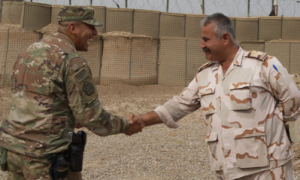A US strike which killed Iranian general Qassem Soleimani in Baghdad in January, and the counter-strike by the Iranian military on US targets in Iraq, raised serious questions about the legitimate use of force. When military force was used against targets within its territory, Iraq’s sovereignty was breached.
As a country caught in the middle of the long-running feud between the US and Iran, Iraq has already suffered a great deal in this latest escalation. A senior Iraqi militia commander, Abu Mahdi al-Muhandis, was also killed in the US strike.
In the weeks since, thousands of protesters have taken to the streets in Iraq. While some continue to demonstrate against the government, others – many of them supporters of Shiite cleric Muqtada al-Sadr – are demanding the withdrawal of US troops from the country.
The continued US military presence in the country, against the wishes of the Iraqi government and parliament, is a breach of international law.
Force and intervention
Public international law maintains a tight grip on the rules surrounding the use of force. Article 2(4) of the UN Charter prohibits the use of force, except in self-defence against an armed attack or collective action authorised by the UN Security Council.
Beyond this, there are very few truly accepted justifications which a country can rely on to legitimately use force within another’s territory. One exception is a doctrine called “intervention by invitation”, where one country is given express permission to take military action in another country by that country’s government.
Read more: yahoo
Ask me anything
Explore related questions





